Please fill out the following information, and RRFC Admissions will contact you to discuss our program offerings:
Issue #226
by Liya Swift
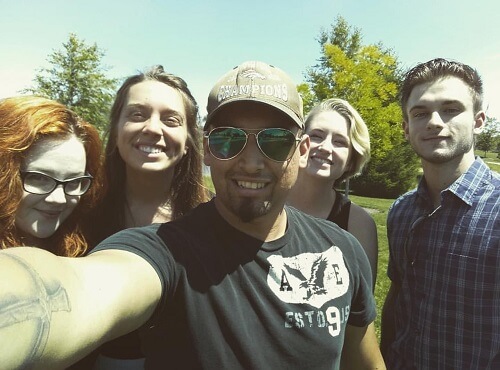
Arronn Lepperman with cast of Into the Haunt
We recently spoke with recent Film Connection graduate Arronn Lepperman, who after years of thinking about enrolling in our Film Production & Editing program, finally took the plunge and got mentored by Film Connection mentors Bayou Bennett and Daniel Lir of The Dream Team (Los Angeles, CA). The result? Arronn graduated with the filmmaking knowhow he needed to write, direct, and produce his own feature film, Into the Haunt, mostly shot at a popular haunted attraction park in Caldwell, Idaho.
What led you to Film Connection in the first place?
“I started looking into Film Connection when I was just 17 years old and it just seemed like a great program, very unique and very hands-on, and it was just a way of learning that I feel like I could really excel in… For years would just dream and go onto the website and just look at all the different reviews and testimonies and stuff and just really thought it was something I wanted to do.”
What happened once you made the call?
“It was just a dream come true. So I met with Matthew Johnson [Director of Admissions] over the phone. He gave me the rundown of meeting with Daniel and Bayou, that they would interview me and see if I would be a good fit to take the program [with them], and if I would be accepted. Then, I met with Daniel and Bayou. It was really great…It just seemed that we clicked. So that’s where it all began, and I started working with them.”
What did Bayou and Daniel ask you during the interview?
“They basically asked what I wanted out of this and what my hopes and dreams were. I told them that my goal was just to be a filmmaker. Kind of every aspect from the beginning to the end of making a film, I just wanted to do that and just tell stories, tell my stories that I’ve managed to conjure up in my 25 short years of life. So that was basically it, and I think things just clicked between us. We kind of shared this positive energy and uplifting type of demeanor about us that we just knew it would work between us. And we knew we were going to have fun… (Article on Arronn’s one-on-one training with Film Connection mentor Ron Peterson.)
Bayou was very, very intelligent and very good at what she does. She used to teach at New York University and she was very gifted working with the students. Daniel was more of the one-two mentor, [who would concentrate on] the actual program, stuff like that.”
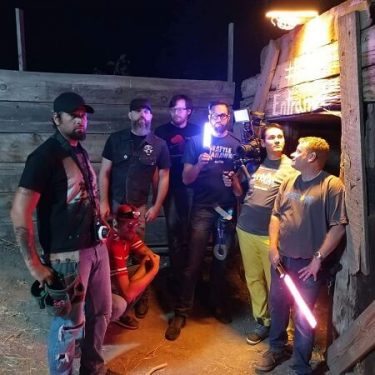
Crew of Into the Haunt: Lee Harvey (grip, Jeff Utter (slate), AJ Duthie (sound) Chris Kulin (sound assist) Ryann Race (AC) Kody Newton (DP)
You shot your entire feature film, Into the Haunt, in just 16 days. How’d the shoot go?
“Little by little in any horror movie, it starts out, you know, mild and then it just keeps building to this horrific event…[so] I wanted to shoot completely in sequence because, especially in a horror movie, little by little things tend to get worse.
Our first day of shooting was at a motel, and everyone was kind of awkward…From the cinematographer to myself, to the sound guy to the grip workers to the actors, nobody really knew each other that well. So we got that out of the way. Then we filmed at the gas station. Then from there we ended up going “into the haunt,” into this haunted attraction. That’s when it really started to get fun, because now we were surrounded by all these giant props and spooky things, and it was just amazing. And it was day three, so we were all getting comfortable with each other and laughing together.”
Bayou and Daniel also helped you make a crucial decision in hiring your cinematographer.
“I met with a [cinematographer] around here, and she works for HP, and she had a lot of very nice equipment and everything, and I was really impressed with her and I met with her in person. We got together and talked about the project, and she said it was something she’d really want to do… then at the very end of it, she wrote her fee, and she said, ‘I’m looking at $100 an hour for this shoot,’ and I about fell over…I told Daniel and he said, ‘That’s insane.’ That’s like Disney production type of dollars.’
If I didn’t have [Daniel and Bayou], I would just assume that that was the going rate and that I would just have to have some way to come up with almost $10,000 to pay somebody for 10 days. So yeah, without them to let me know that that’s not a good route to take, I don’t know where…We probably wouldn’t even have been able to make the film. So that was just a huge blessing…
It was amazing to go about this process with them in my back pocket, and any issues I ran into I would call them about and they would help me out. I mean, what else do you need, really, than that kind of mentorship? It was pretty phenomenal.”
Where are you at now with Into the Haunt?
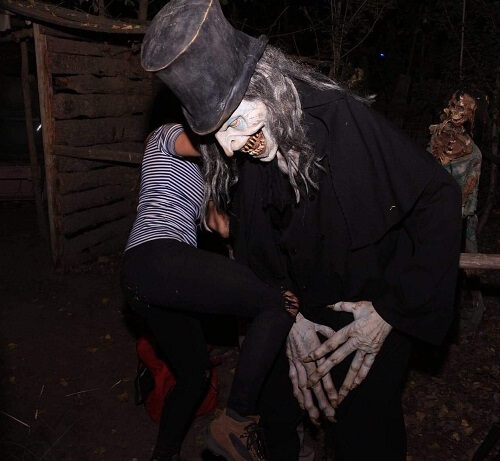
Actors Olivia Abormeit and David Riley rehearse a physical scene.
“We’re in the editing process as we speak. I’m working with an editor. I’ll go over there to check on it and we’ll do some things together…He’s sending me the finished work that he’s getting done for the rough cut, and we’re going from there.”
What’s your advice for Film Connection students on how they can make the most of the program?
“Don’t be afraid to be unique and don’t be afraid to just go after it…I haven’t worried one thing about this production. I haven’t worried once about it and I’m not going to start now. Even though it came within about a week and a half of our first day of shooting and I didn’t have a cinematographer and I didn’t have a camera, I was like, I’m not worried…With the guidance of the great mentors that Film Connection provides, and the right drive and determination and faith in yourself, you cannot go wrong with the results.”
Learn more about Film Connection’s programs and workshops in film.
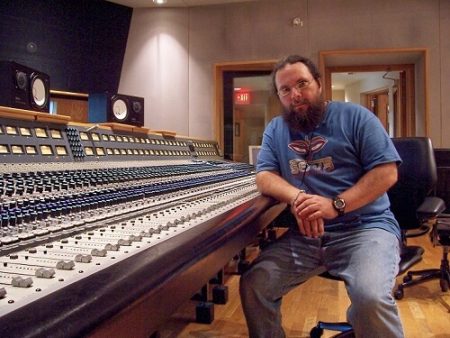
Recording Connection mentor Seva Ball
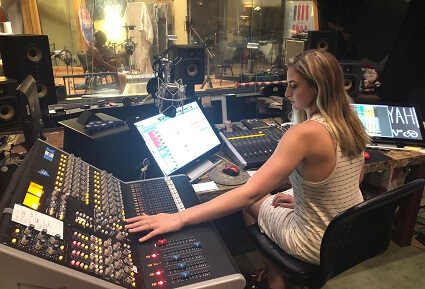 Recording Connection graduate Gabby Kilgore communicated her wants to her mentor Seva Ball. Then, she got busy learning and proving her value on the job. When the time came, Seva hired her on as his first assistant engineer and more!
”I truly believe what led to my hire was the goal that I told Seva before I started the program. When asked what I hoped to accomplish after completing the course, I said that I wanted to start my own publishing company, and really get into branding and promotion of new talent.
Now, Sequoyah Studios has signed some of our own artists which we help with promotion, social media, and branding along with the recording, mixing, and mastering…
Seva has been the best mentor I could ask for! While working with him, you really never stop learning. Everything is a lesson. I have been able to learn hands-on in sessions, tasks of my very own, and on projects. Seva really listened to what I wanted to do with this experience and made it part of my work at Sequoyah Studios!”
Recording Connection graduate Gabby Kilgore communicated her wants to her mentor Seva Ball. Then, she got busy learning and proving her value on the job. When the time came, Seva hired her on as his first assistant engineer and more!
”I truly believe what led to my hire was the goal that I told Seva before I started the program. When asked what I hoped to accomplish after completing the course, I said that I wanted to start my own publishing company, and really get into branding and promotion of new talent.
Now, Sequoyah Studios has signed some of our own artists which we help with promotion, social media, and branding along with the recording, mixing, and mastering…
Seva has been the best mentor I could ask for! While working with him, you really never stop learning. Everything is a lesson. I have been able to learn hands-on in sessions, tasks of my very own, and on projects. Seva really listened to what I wanted to do with this experience and made it part of my work at Sequoyah Studios!”
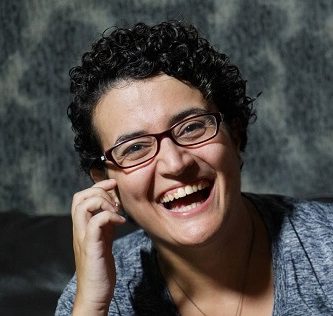 Congrats to Film Connection grad Giovanna Caruso for winning an Accolade Global Film Competition Award for her short film “A Life Worth Living” which deals with the emotional struggles of a terrible loss, and the different ways people face grief. Speaking of the accomplishment, Giovanna says:
“I am honored to have received this award in such an early stage of my career. Making this short film was one of the best and most terrifying experiences of my life. When I first moved to this country, I wasn’t able to speak English and I used movies as a tool to learn this wonderful language. Seven years later , I have written a script and produced it alongside the amazing Rocco Michaluk [her former Film Connection mentor].”
Congrats to Film Connection grad Giovanna Caruso for winning an Accolade Global Film Competition Award for her short film “A Life Worth Living” which deals with the emotional struggles of a terrible loss, and the different ways people face grief. Speaking of the accomplishment, Giovanna says:
“I am honored to have received this award in such an early stage of my career. Making this short film was one of the best and most terrifying experiences of my life. When I first moved to this country, I wasn’t able to speak English and I used movies as a tool to learn this wonderful language. Seven years later , I have written a script and produced it alongside the amazing Rocco Michaluk [her former Film Connection mentor].”
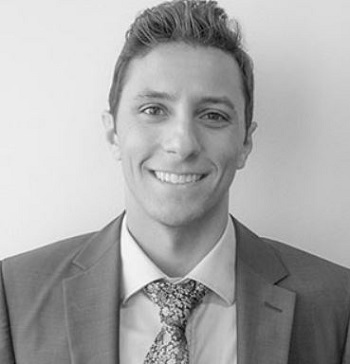
Academic Facilitator Joe Cilento, RRFC.

RRFC is education upgraded for the 21st century.
Get the latest career advice, insider production tips, and more!
Please fill out the following information, and RRFC Admissions will contact you to discuss our program offerings:
Stay in the Loop: Subscribe for RRFC news & updates!
© 2025 Recording Radio Film Connection & CASA Schools. All Rights Reserved.
